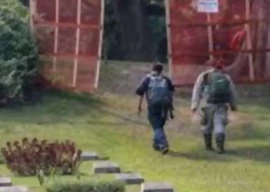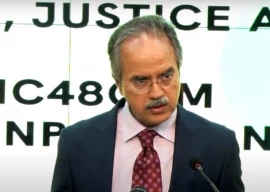
"A group of extremists ... is holding hostage security elements and civilians, threatening to execute them unless a siege by security forces is lifted" in Al-Baida, the official told AFP, asking not to be named.
The group calls itself "Islamic Emirate of Barqa," after the ancient name of a region of northwest Libya, he said.
Justice Minister Mustafa Abdeljalil started negotiations late on Saturday for the hostage-takers to release their captives, he said. "But we will not negotiate over Libya's integrity under any circumstances."
The official said the same group was responsible for the hanging of two policemen in Al-Baida on Friday that was reported in Oea newspaper.
According to Human Rights Watch, at least 23 people have died in Al-Baida since Tuesday in clashes between security forces and protesters against the four-decade rule of Libyan leader Moamer Kadhafi.
Libya has over the past five years freed around 850 prisoners from different Islamist groups, 360 of them since March.
Among those released were jihadists with ties to Al-Qaeda's Iraqi and North African franchises, including senior members of the Libyan Islamic Fighting Group (LIFG) such as its chief Abdelhakim Belhaj.
In November 2007, Al-Qaeda number two Ayman al-Zawahiri allegedly said the LIFG had joined his network, in an unverified audio recording posted online.
But the Kadhafi Foundation headed by Seif al-Islam, son of Kadhafi, said in 2008 that Islamists held in Libyan prisons and previously linked to Al-Qaeda had renounced their ties.
LIFG was formed in the early 1990s in Afghanistan by Libyan militants who took up arms against Soviet occupation forces. Their stated aims are to overthrow Kadhafi's regime and establish an Islamic state.
The group was led from central Asia by Abu Laith al-Libi, a top lieutenant of Al-Qaeda leader Osama bin Laden, until his killing in February 2008 in a US missile attack in the tribal northwest of Pakistan.
In March 2006, Libya released 84 jailed members of the country's banned Muslim Brotherhood movement held since the late 1990s.
Fify-five of those freed returned to Benghazi, Libya's second largest city and reputed opposition stronghold that has been the scene of some of the deadliest clashes over the past week.
Libya in 1998 arrested 152 Brotherhood members. In 2002, two members were sentenced to death, 73 to life in prison and 66 were acquitted, while the others were handed 10-year jail terms.
Those condemned, mainly students and academics, were accused of supporting or belonging to Al-Jamaa al-Islamiya al-Libiya, an Islamist group whose beliefs mirror those of Egypt's Muslim Brotherhood.
The offenders are generally charged with violating Libya's Law 71, which bans political activity opposed to the principles of the 1969 revolution in which Kadhafi took power.
Evicting Libya's monarchy, Kadhafi has since ruled the country with an iron fist, imposing an ideology inspired by socialism and Islam that he presents as the ultimate evolution of democracy and is enshrined in his "Green Book."

1721377568-0/BeFunky-collage-(18)1721377568-0-165x106.webp)















COMMENTS
Comments are moderated and generally will be posted if they are on-topic and not abusive.
For more information, please see our Comments FAQ